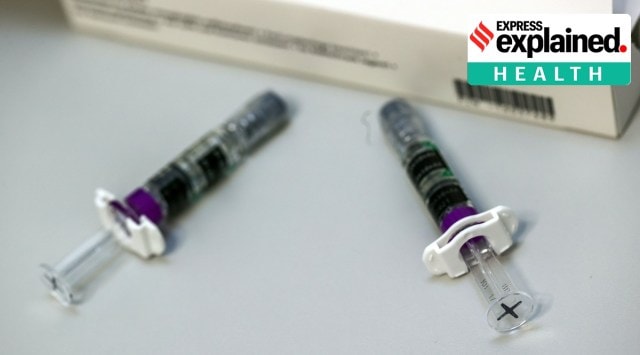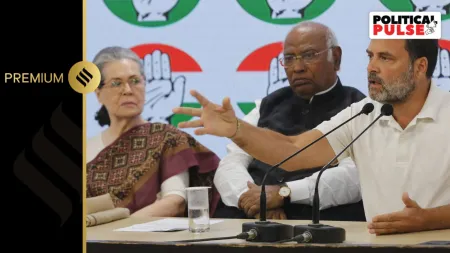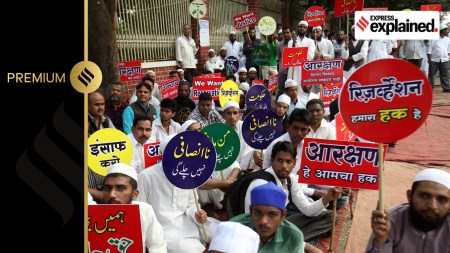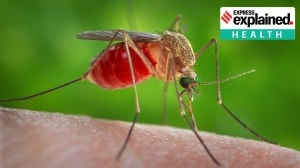- India
- International
Explained: What is emergency use authorisation firms are seeking for Covid-19 vaccines?
Coronavirus vaccines: Pfizer has applied for emergency use authorisation of its vaccine; Moderna and Serum Institute of India too plan to apply to the respective authorities. What is the process, and how is it different from full approval?
 The fastest approval for any vaccine till now came about four and a half years after it was developed. This was for a vaccine for mumps, granted in the 1960s. (Bloomberg Photo: Alex Kraus, File)
The fastest approval for any vaccine till now came about four and a half years after it was developed. This was for a vaccine for mumps, granted in the 1960s. (Bloomberg Photo: Alex Kraus, File)On Monday, US drugmaker Moderna said it was applying for emergency use authorisation for its Covid-19 vaccine. A few days earlier, Pfizer applied for emergency use authorisation for the vaccine it has developed in collaboration with BioNTech.
In India, Serum Institute of India, which is trialling a version of the AstraZeneca-Oxford vaccine, has said it expects to seek emergency use authorisation within the next two weeks.
What is emergency use authorisation (EUA)?
Vaccines and medicines, and even diagnostic tests and medical devices, require the approval of a regulatory authority before they can be administered. In India, the regulatory authority is the Central Drugs Standard Control Organisation (CDSCO).
For vaccines and medicines, approval is granted after an assessment of their safety and effectiveness, based on data from trials. In fact, approval from the regulator is required at every stage of these trials. This is a long process, designed to ensure that a medicine or vaccine is absolutely safe and effective. The fastest approval for any vaccine until now — the mumps vaccine in the 1960s — took about four-and-a-half years after it was developed.
In emergency situations, like the current one, regulatory authorities around the world have developed mechanisms to grant interim approvals if there is sufficient evidence to suggest a medical product is safe and effective. Final approval is granted only after completion of the trials and analysis of full data; until then, emergency use authorisation (EUA) allows the medicine or the vaccine to be used on the public.

Also in Explained | An Expert Explains: The road to mass vaccination against Covid-19
 At the Serum Institute of India in Pune. (PTI Photo)
At the Serum Institute of India in Pune. (PTI Photo)
When can EUA be granted?
In the US, the Food and Drug Administration (FDA) grants an EUA only after it has been determined that the “known and potential benefits outweigh the known and potential risks of the vaccine” (or medicine). This means that an EUA application can be considered only after sufficient efficacy data from phase 3 trials had been generated. An EUA cannot be granted solely on the basis of data from phase 1 or phase 2 trials, although these too need to show the product is safe.
For Covid vaccines, the FDA has specified that it would consider an application for EUA only if phase 3 data showed it was at least 50% effective in preventing the disease. This data needed to be generated from “well over” 3,000 trial participants, “representing a high proportion of participants” enrolled. These participants needed to be followed up for any serious adverse effects for at least one month after all dosages had been given.📣 Follow Express Explained on Telegram
What is the process of getting an emergency use authorisation in India?
Experts and activists say India’s drug regulations do not have provisions for an EUA, and the process for receiving one is not clearly defined or consistent. Despite this, CDSCO has been granting emergency or restricted emergency approvals to Covid-19 drugs during this pandemic — for remdesivir and favipiravir in June, and itolizumab in July.
“We still don’t know the story behind these approvals — we haven’t seen the clinical trial data published anywhere and we haven’t seen the protocols that were followed for each drug,” said Murali Neelakantan, lawyer and former global general counsel for Cipla and Glenmark Pharmaceuticals.
“The US FDA regulations are clear about the conditions and process for receiving an EUA. In India, I’ve gone through the entire legislation trying to find any clause that has a remote chance of being used for either emergency or restricted use and still haven’t found any provision that allows it here,” he said.
He also observed that some of the drugs that have received restricted emergency approvals in India, like itolizumab, were not subsequently included in the country’s Covid-19 Clinical Management Guidelines. :So, what was the basis for the ‘approval’ and why is that not good enough for it to be included in the treatment protocol?” he said.
How will a Covid-19 vaccine get an EUA in India, then?
That remains to be clearly spelt out. A senior government official earlier told The Indian Express that any company seeking to launch a vaccine approved elsewhere would have to conduct local trials to prove it is safe and effective on the Indian population.
In the case of the AstraZeneca-Oxford candidate (AZD1222), Serum Institute of India is conducting trials of its version, Covishield, on around 1,600 participants in India. Bharat Biotech is currently conducting phase 3 trials of its vaccine, Covaxin, and has said it will not be approaching CDSCO for an EUA. Dr Reddy’s Laboratories (DRL) is hoping to start phase 2/3 trials of the Russian Sputnik V vaccine; it is unclear whether it plans to seek an EUA.
SII CEO Adar Poonawalla has said the company plans to apply for EUA in two weeks, but has not specified the process. He had earlier hinted at SII approaching CDSCO for such approval only after AZD1222 received EUA in countries like the UK.
In the last two weeks, AstraZeneca and Oxford University have published interim findings of their vaccine’s efficacy, adding it will be put these together for a scientific journal and approach regulators around the world for EUAs or permission to conduct additional trials. It is possible that SII will push for an EUA to market the vaccine in India sooner, on the basis of the results of its small-scale trials in India, as well as the larger data set from the global trials.
 A small shopping basket filled with vials labeled “COVID-19 – Coronavirus Vaccine” and medical sryinges are placed on a Moderna logo in this illustration. (Reuters: Dado Ruvic/Illustration)
A small shopping basket filled with vials labeled “COVID-19 – Coronavirus Vaccine” and medical sryinges are placed on a Moderna logo in this illustration. (Reuters: Dado Ruvic/Illustration)
How often has EUA been granted?
EUA is a relatively recent phenomenon. According to Joshua Sharfstein, vice dean for Public Health Practice and Community Engagement at the Johns Hopkins Bloomberg School of Public Health, the FDA granted its first EUA for the civilian population in 2009. In an interview published on the school website in October, Sharfstein said the first EUA allowed the use of Tamiflu drug for infants and young children for the treatment of H1N1 infection.
Since then, EUAs have been granted for several medicines, diagnostics, and equipment like ventilators or even PPEs, but never for a vaccine. An EUA can be granted only in a declared public health emergency; previous EUAs came during the spread of the Ebola virus, Zika virus and MERS coronavirus.
Remdesivir or faviparir, which received EUA for treatment of Covid-19, including in India, are existing drugs approved for other ailments. They could not be administered to Covid-19 patients without extensive trials, but because they showed promise in limited testing, in specified conditions, they were therefore “repurposed” for Covid-19 patients through EUAs.
Is there a risk in using a product that has only been granted an EUA?
According to the US FDA, the public has to be informed that a product has only been granted an EUA and not full approval. In the case of a Covid-19 vaccine, for example, people have to be informed about the known and potential benefits and risks, and the “extent to which such benefits or risks are unknown”, and that they have a right to refuse the vaccine.
There has been an ongoing debate over whether people have the option of refusing to take the vaccine. Incidentally, no country has made vaccination compulsory for its people. Initially, all vaccines are likely to be deployed on emergency use authorisations only. Final approval from respective authorities may take several months, or years.
Don’t miss from Explained | Why influenza makes people vulnerable to bacterial infection
xMore Explained
EXPRESS OPINION
May 10: Latest News
- 01
- 02
- 03
- 04
- 05








































